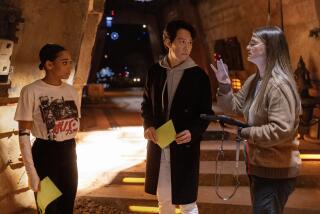Lawyering at Warp Speed
- Share via
From Miami — Captain Jean-Luc Picard and the Enterprise may escape Earth and ultimately the galaxy, but a study by two professors shows they can never escape lawyers.
Can Cmdr. Will Riker be extradited to a planet with a non-federation legal system? Is android Data entitled to human rights as a sentient being? Should a mind-reading Betazoid be used for interrogations?
Those legal questions and more are raised in “Star Trek: The Next Generation,” say Nova University law professors Paul Joseph and Sharon Carton, who published an analysis of the TV series in the University of Toledo Law Review.
The study began as a joke. But it became serious when the professors found the nation’s most popular syndicated series deals with the thorny legal issues in a consistent manner, Joseph says.
“If they were doing it in a silly or unthoughtful way, we couldn’t do this,” he says.
“Star Trek” creator Gene Rodenberry envisioned a world--indeed an entire universe--without attorneys at all, say the professors, who worked with the show’s writers on their article.
But a legal system and something very much like lawyers are clearly in place by Picard’s era in the 24th Century, Joseph says.
One episode makes reference to a slaughter of all lawyers in the year 2079 after a nuclear holocaust, and temporary adoption by courts of a “guilty until proven innocent” rule.
But by the time of the Enterprise’s adventures, a recognizable legal system has been restored.
Several episodes refer to a constitution, says Joseph. “They also talk about ‘guarantees’--evidently the equivalent of our Bill of Rights.”
Picard, in one episode, invokes “Guarantee Seven,” expressed as a right against self-incrimination.
And Picard offers legal counsel to a crewman undergoing a loyalty interrogation by a telepathic Betazoid in another episode.
“How much privacy are we willing to violate?” asks Joseph. “Are we willing to open people’s very minds?”
The most fascinating legal issues grow out of the imaginary technology and alien discoveries of the future.
One recurring issue is the definition of life. Data’s status as a sentient being is questioned in one story in which an eager researcher wants to pull him apart. In another, a microscopic surgery robot begins reproducing after an experiment, and begins to eat the ship’s circuitry. Are they alive? Can they be destroyed?
While the problems can be fascinating, the “Star Trek” solutions tend to fit in with the universal desire to make the legal system more informal.
“They don’t fall back on procedure,” says Joseph. Many issues are discussed during semi-formal hearings in which the various sides argue their own cases. In some, the bridge officers act as advocates or judges. In the Data story, for example, Riker must act as the de facto prosecutor against his friend.
“It’s a dual-track legal system, and it works in a time when people are more interested in fairness,” Joseph says.
But the Enterprise crew’s “warp speed” informal solutions work less well when they get off the ship and must deal with alien legal systems, he notes.
Still, it’s a system that makes most 1993 “Star Trek” fans--non-lawyers, anyway--envious of its speed and directness, he says.
“We live in a very distrustful time,” says Joseph. “I would not trust my friends and buddies to judge me. Today, we want guarantees and procedures based on our distrust--and with procedures, you get lawyers.”
“Star Trek: The Next Generation” airs Mondays at 9 p.m. on KCOP, with weeknight repeats at 7 p.m.
More to Read
The complete guide to home viewing
Get Screen Gab for everything about the TV shows and streaming movies everyone’s talking about.
You may occasionally receive promotional content from the Los Angeles Times.






